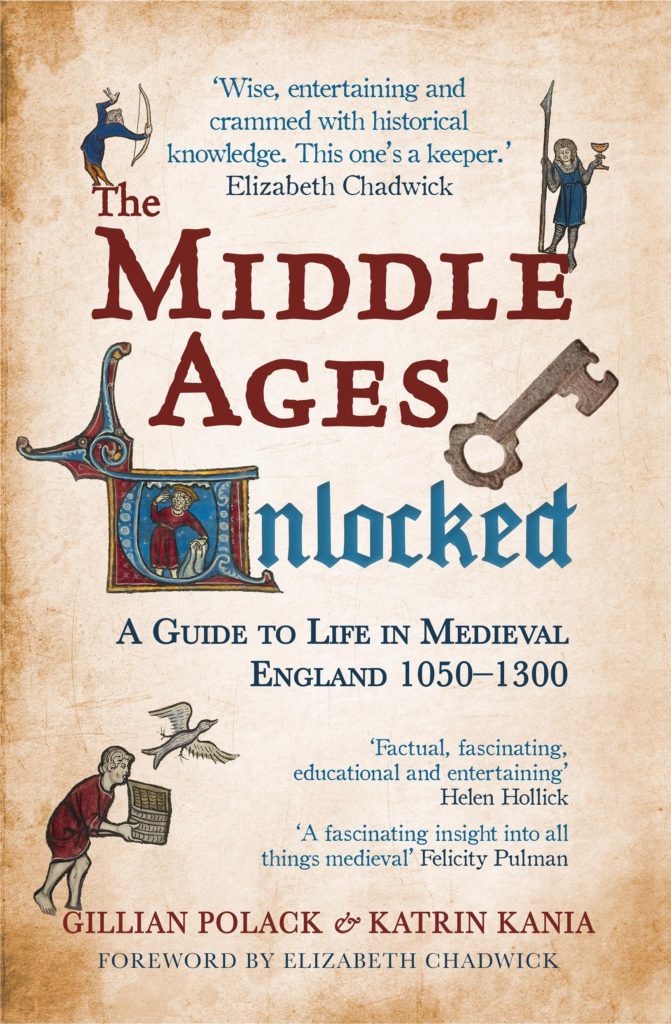Around the Podosphere #13: Podcasts of Note for June 24
It’s been a long time since I’ve posted one of these. Since the Skiffy and Fanty crew collectively listen to more podcasts than there are episodes of our show (totally scientific, promise), it’s about time we brought the Around the Podosphere back to share some of the goodness worming its way into our ears. So, here goes:
Book Review: The Middle Ages Unlocked: A Guide to Life in Medieval England, 1050-1300, by Gillian Polack and Katrin Kania

“The past is a foreign country: they do things differently there” — L.P. Hartley The conceptions and misconceptions of what medieval life was really like influence our perceptions of who we are as people, and the fiction and worlds that we create. There is a real struggle within certain sectors of the SFF genresphere about the fiction based on the world within what I call the “Great Wall of Europe”, fantasy with the viewpoint and a setting firmly grounded in conceptions of what Medieval Europe was like. Be it George R.R. Martin’s Westeros, or Kate Elliott’s Wendar and Varre, or a hundred others, Medieval Europe is, for a lot of writers and readers, THE setting to base their fantasy upon. However, many other writers get basic facts about Medieval Europe unintentionally wrong, further accentuating and perpetuating stereotypes and misconceptions about the Medieval world and mindset when they plug those misconceptions into their fiction, and those misconception are reinforced as misinformation about the real Medieval Europe.
On Fury and Fairies and the Remnants of Gods by Gillian Polack

The other day, someone said to me that Tolkien’s elves were the real thing, because he was a Medievalist and so he knew. I’m a Medievalist and I know, too, and what the real thing is depends so very much on where one is and what one is writing. I’m not at all certain that Tolkien would have liked to be told that the closest thing to his elves in Old French tales are the blonde fairies (with hair that is red-gold, like fine wire, and the palest of skins and the prettiest of rose colouring on their cheeks) in the Arthurian romances. They are not the stuff of folkdom. They’re not even terribly legendary. They’re the object of quests by knights who don’t quite fit at court. They have the best tents and the most beautiful horses and an unlimited number of handmaidens more beautiful than anyone else in sight apart from the fairy herself. They’re not that real. When I stop and think about Tolkien’s elves, they’re not quite as perfect, but they come close at times. They’re not perfect because they’re annoyingly “I know so much and don’t see why I should tell you.” Neither of them have wings. These fairies are not the hidden folk of any of the various regions in Western Europe. They’re a literary construct. In fact they appear in the Marvel and DC of their time. I shall refer to the lead fairy (the one who the knight wins) as the Nick Fury of the magic realms from now on when I need to, on panels.
Around the Podosphere #12: Podcasts of Note for 8/17/15
A new slate of podcasts has arrived. In this edition of Around the Podosphere, we’ve got a few bad movies, some intense book discussions, a lost ship, and at least one Texas conspiracy theory! There’s plenty stuff here to keep you busy for the rest of the week. What have you been listening to? Tell us in the comments! Here’s our list:
266. Juliet E. McKenna (a.k.a. the Historian) — An Interview at LonCon3

http://media.blubrry.com/skiffyandfanty/dts.podtrac.com/redirect.mp3/archive.org/download/SandFEpisode266JulietEMcKenna/SandF%20–%20Episode%20266%20–%20Juliet%20E%20McKenna.mp3Podcast: Play in new window | DownloadSubscribe: Apple Podcasts | Spotify | Android | iHeartRadio | Podchaser | Podcast Index | Email | TuneIn | Deezer | RSSLondon, airplanes, and history degrees, oh my! Author Juliet E. McKenna joined Shaun, Julia, and Paul at LonCon3 last year to discuss her work, politics and their influence, her experience with historical research, and feminism! We hope you enjoy the episode! Note: If you have iTunes and like this show, please give us a review on our iTunes page, or feel free to email us with your thoughts about the show! Here’s the episode (show notes are below): Episode 266 — Download (MP3) Show Notes:
The Muse of Research: An Interview with Lev Mirov

The Muse of Research is a monthly column in which E. P. Beaumont interviews poets, medievalists, and speculative writers about their research. This week, E.P. Beaumont talks to Lev Mirov. E. P. Beaumont: Talk about your nonfictional obsessions! (could be academic training, stuff you like to read about, topics that pique your curiosity) Lev Mirov: I’ve studied medieval Europe widely, and I have put a lot of time and energy into the history of western magic, folk Christianity, 12th century England, ritual studies, and the relationship between western religion and esotericism and indigenous cultures. In 2011, I wrote an undergraduate thesis on gender and military leadership in 12th c. England and France, and, in 2014, a master’s thesis about magical rituals as expressions of religious life in later medieval England.

